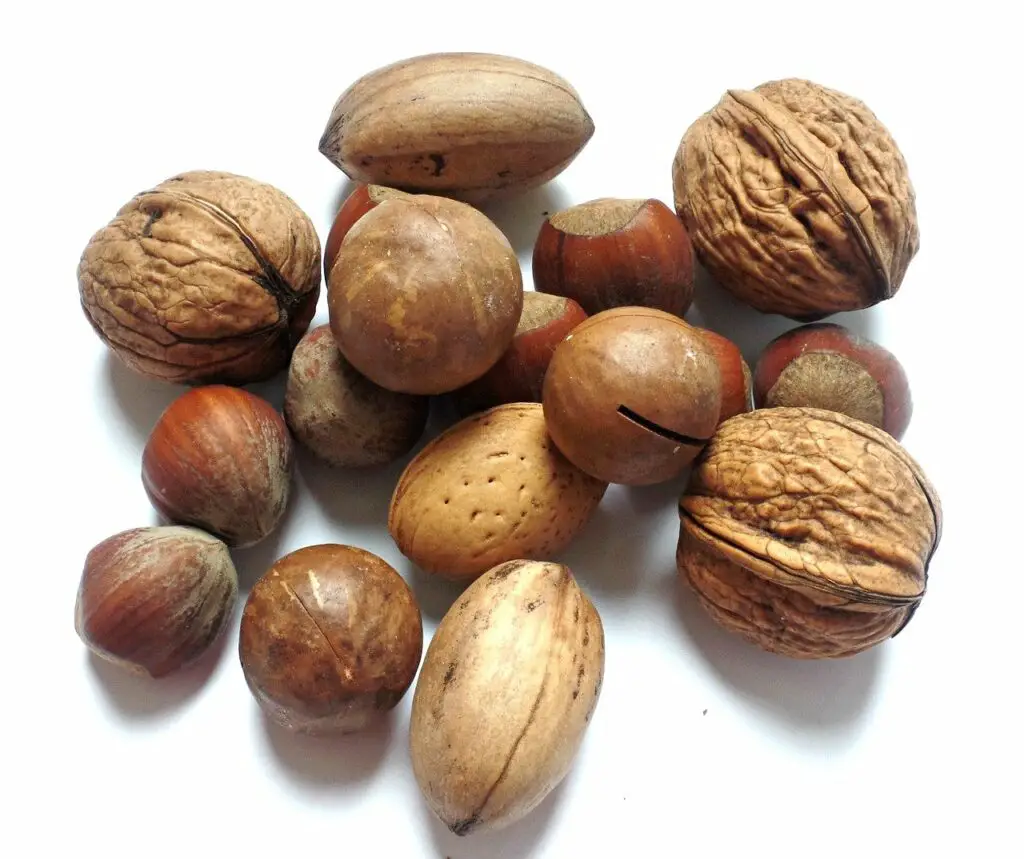Brazil nuts are an excellent grab-and-go treat as they’re tasty and loaded with many health benefits.
This includes supporting brain function and improving heart health.
If you enjoy snacking on these delicious nuts, you might wonder if it’s safe to let your dog have some too.
So, can dogs have Brazil nuts?
No.
Dogs should not eat Brazil nuts as they are high in fat and calories, leading to unnecessary weight gain and other health issues.
Brazil nuts can also be a choking hazard as they’re large and oddly shaped.
This article will explain the risks of feeding your dog Brazil nuts and why they are not recommended for dogs.
It will also discuss healthier alternatives to Brazil nuts.

Harmful effects of Brazil nuts on dogs
While Brazil nuts may be a nutritious snack for us, these nuts can cause harmful side effects for fidos.
Some of these effects may include:
- Choking hazard
Feeding your dog Brazil nuts can cause choking.
This is because Brazil nuts are large, which can be challenging for your dog to chew.
If your dog accidentally swallows Brazil nuts as a whole, they may be lodged in his throat or even cause an intestinal blockage in the digestive tract.
Monitor your dog closely and look for signs such as distress, pawing at the mouth, salivation, difficulty breathing, coughing, gagging, or retching.
If your dog suffers an intestinal obstruction, he may require an immediate visit to the vet as it may cause long-term health issues if left untreated.
- Gastrointestinal distress
Brazil nuts are rich in fiber and can be challenging for your dog’s digestive system to handle, especially when consumed in large amounts.
The digestive difficulties for your pup may include excessive drooling, diarrhea, constipation, regurgitation, and loss of appetite.
In worst cases, your dog may experience problems with the pancreas, which can lead to pancreatitis.
If you see any of these signs, take your dog to the vet immediately as he may require immediate vet care.
- Rapid weight gain
Brazil nuts have a high-fat and high-caloric content, making them a great contributor to weight gain and obesity.
If your dog suffers a condition like diabetes, Brazil nuts may be even worse as it may aggravate the problem further.
Feeding your dog too much Brazil nuts can cause other health issues like high blood pressure, heart disease, and joint pain.
- Nut allergies
Some dogs may be allergic to Brazil nuts and may experience symptoms ranging from mild to severe depending on exposure.
Feeding your dog Brazil nuts may expose his digestive system to unfamiliar processing, leading to an allergic reaction.
Some signs to watch out for include swelling, hives, coughing, and difficulty breathing.
If your dog experiences any of these symptoms, consult your vet immediately for further instructions.

What happens if my dog eats Brazil nuts?
If your dog eats Brazil nuts in moderation, it probably won’t have worrying side effects.
Your dog may experience a mild digestive upset as they are high in fats which can be difficult for your dog to digest.
Other health risks may include obesity, high blood pressure, diabetes, and other cardiovascular diseases.
Your dog may also suffer obstructions to the esophagus, trachea, or intestines which can cause serious digestive issues.
If your dog ingests Brazil nuts, watch out for these signs of intestinal obstruction:
- Vomiting
- Diarrhea
- Loss of appetite
- Constipation
- Abdominal pain
Can my dog eat Brazil nuts?
While these nuts aren’t entirely toxic for your dog, they can cause mild to severe symptoms depending on the amount consumed, the size of your dog, age, and overall health.
Eating even one Brazil nut for a small dog could be harmful as it may cause digestive distress, including intermittent vomiting and diarrhea.
If your dog takes a large amount of Brazil nuts, he might experience more severe issues like diabetes, obesity, or pancreatitis.
Brazil nuts alternatives for dogs
Generally, most vets recommend leaving nuts out of your dog’s diet.
However, some varieties can be acceptable for dogs to eat in moderation. These may include:
- Peanuts – Peanuts are a good source of protein and healthy fats for dogs. They also contain vitamin B6, vitamin E, niacin, and phosphorus, which are essential for dogs’ healthy growth.
- Cashews – Cashews are high in fiber, heart-healthy monounsaturated fats, and immune-boosting nutrients like zinc and magnesium. They’re also high in copper, essential for your dog’s joints and bones.
- Roasted chestnuts – Chestnuts are full of protein, fiber, omega-3 fatty acids, and vitamins which can be a great addition to your dog’s diet every once in a while.
Why are Brazil nuts not recommended for dogs?
Brazil nuts in large amounts can wreak havoc in your dog’s system as they’re loaded with fats and calories, promoting weight gain and other health issues.
Brazil nuts also contain:
- Selenium
Brazil nuts are rich in selenium which can cause selenium toxicity in dogs if consumed in large amounts.
Selenium toxicity causes side effects such as nausea, vomiting, depression, nervousness, and loss of nails and hair.
- Aflatoxin B1
Brazil nuts may also contain Aflatoxin B1, a poisonous substance made by a mold called Aspergillus flavus.
This mold can lead to severe health issues, including aflatoxicosis, liver damage, and death, especially if consumed in large amounts.
- Salt
Brazil nuts are often coated with salt, leading to excessive thirst, dehydration, abnormal urination, seizures, lethargy, and uncontrollable quivering.
The high sodium content can also cause salt toxicity, a condition which is potentially lethal for dogs.
- Excess fats
Brazil nuts have a high-fat content and, when ingested by dogs, may cause pancreatitis, which in some cases may be fatal.
This is when the pancreas is inflamed and can cause symptoms such as vomiting, abdominal pain, loss of appetite, fever, and lethargy.
Brazil nuts also have a high-caloric density, making them a great contributor to weight gain and obesity.
- Flavorings
Some Brazil nuts may be covered in additional flavorings to enhance their taste but can cause or exacerbate allergies and even be carcinogenic.
In conclusion
Allowing your fido to eat a bit of what you’re having, including Brazil nuts, is natural.
However, dogs do not appreciate some of the components in Brazil nuts, like excess fats, hence why you should avoid them entirely.
Consult your vet before adding Brazil nuts to your dog’s diet to avoid poisoning.
- What Dog Breeds Have Pink Skin? - March 24, 2023
- What Are the Most Inspiring Dog Breeding Quotes? - March 20, 2023
- Can Pheromone Spray Help Improve Dog Breeding Results? - March 19, 2023








